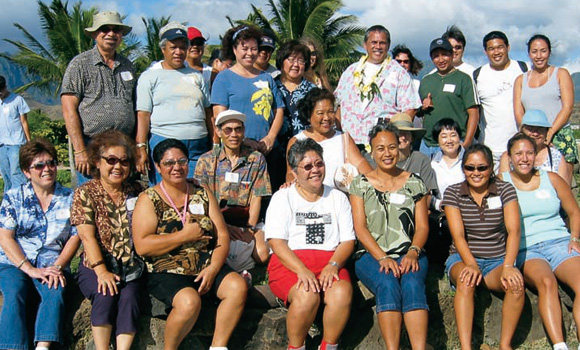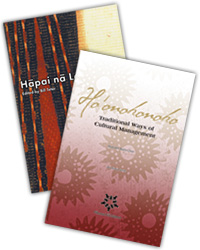
The Pihana Nā Mamo project, a collaboration with the Hawai’i Department of Education (HIDOE) and funded by the U. S. Department of Education through the Native Hawaiian Education Act, wrapped up a successful 9-year collaboration in 2009 with impressive results in the classroom and the completion of a ground-breaking series of publications.
The Pihana Nā Mamo project sought to improve the education of Native Hawaiian children through six components: (1) the implementation of research-based reading programs, (2) mentoring and transition support for secondary students, (3) parent and community involvement, (4) project administration, (5) curriculum materials, and (6) program evaluation.
Under a formal memorandum of agreement, the HIDOE was largely responsible for the first three project components, and CRDG was largely responsible for the last three. All six components were designed and carried out with an emphasis on cultural appropriateness, particularly for Native Hawaiian students.
 Pihana Nā Mamo served large numbers—50 schools, 500 teachers, 9,000 students (5,500 Hawaiian/Part-Hawaiian), 50 administrators, and 600 parents and community members—each year, and despite being mostly in high-poverty schools, has produced excellent graduation rates; reading scores well above normative expectations, including in AYP terms; and sustainable results. Every Pihana school succeeded far beyond expectations.
Pihana Nā Mamo served large numbers—50 schools, 500 teachers, 9,000 students (5,500 Hawaiian/Part-Hawaiian), 50 administrators, and 600 parents and community members—each year, and despite being mostly in high-poverty schools, has produced excellent graduation rates; reading scores well above normative expectations, including in AYP terms; and sustainable results. Every Pihana school succeeded far beyond expectations.
In addition to their work in the schools, the project worked for several years to publish a series of eleven books on Native Hawaiian virtues and values by noted cultural specialist Malcolm Nāea Chun and published the final title, Ho’onohonoho, in 2009 to complete the series. In addition, ULS English teacher and curriculum developer Bill Teter joined the project team to produce an anthology of current literature that reflects the themes presented in Chun’s work. Hāpai nā Leo opens with an excerpt from the Kumulipo, closes with a piece of award-winning slam poetry, and in between celebrates a diverse range of voices that explore, carry, and regenerate Hawaiian culture.
The success of the Pihana Nā Mamo project has been recognized with the granting of additional funds to carry on the work in two new three-year Native Hawaiian Education program (NHEP) grants (the fourth and fifth grants awarded to this highly successful collaboration).
Kāko’o Ikaika: Supporting Adolescent Hawaiian Students to Achieve High Standards was funded for $2,485,671 and Heluhelu Maoli: Building Strong Foundations in Reading and Mathematics was funded for $3,116,859. Both projects continued the strong partnership between CRDG and the Hawai’i Department of Education.
